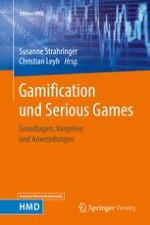2017 | OriginalPaper | Chapter
5. Projekterfahrungen spielend einfach mit der ProjectWorld! – Ein gamifiziertes Projektwissensmanagementsystem
Authors : Silvia Schacht, Anton Reindl, Stefan Morana, Alexander Mädche
Published in: Gamification und Serious Games
Publisher: Springer Fachmedien Wiesbaden
Activate our intelligent search to find suitable subject content or patents.
Select sections of text to find matching patents with Artificial Intelligence. powered by
Select sections of text to find additional relevant content using AI-assisted search. powered by
